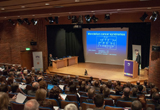 The PHG Foundation’s “Translating Genomics” conference, at Robinson College, Cambridge, on 4 December 2012, was billed as a celebration of 15 years of public health genomics in the UK and an exploration of the future role of genomics in 21st century healthcare: on the day, the focus was very much on the latter.
The PHG Foundation’s “Translating Genomics” conference, at Robinson College, Cambridge, on 4 December 2012, was billed as a celebration of 15 years of public health genomics in the UK and an exploration of the future role of genomics in 21st century healthcare: on the day, the focus was very much on the latter.
PHG Foundation Chairman Ron Zimmern—who founded the UK’s first public health genetics unit in 1997—set the tone with his message that science will not translate itself to health benefits: specific processes must be put in place to move scientific advances into the clinic. He was candid that efforts to convince the wider public health community of the importance of genomics have thus far had limited success, but passionate in his conviction that incorporating genomic understanding is crucial to formulating properly targeted strategies that will improve population health. “The holy grail” he declared “is to stratify populations into different risk categories.”
Under the theme “Using genomics to improve population health” speakers detailed progress in three key areas for genomic medicine: stratified treatment of cancers, evaluation of cardiovascular disease risk, and genetic contributors to obesity. For each, a genomics-based approach has provided breakthroughs, but also encountered obstacles. In his work on obesity for example, Steven O’Rahilly said that whilst genetics has produced dramatic results in rare cases of severe childhood obesity, there has so far been little progress for common adult obesity.
Bruce Ponder highlighted the influence that public opinion may have on potential policy change; that although reclassification of cancer risk based on genomics may have utility and extra inclusions in screening programmes would likely be welcomed, it would probably not be acceptable if it were at the expense of excluding and missing cancers in some of those currently screened, even if it were more resource effective.
Representatives from industry, the health service, data management, and policymaking spoke of the challenges of integrating developments in genomic science. The message was that the genomic revolution is nigh, but that as with any revolution there is resistance to change and a need for significant restructuring to realise the benefits. For example, we may need to re-think our attitudes to sharing clinical data, or to newborn and non-symptomatic screening throughout life: will we want to obtain and store everyone’s full genome sequence as a permanently available “on-demand” clinical resource?
Panel discussion affirmed the central role that traditional disciplines and skills like epidemiology and communicating risk to patients must play, with genomics being described as an additional ‘layer on top’, and there was speculation about the potential for new avenues such as social media to foster communication between scientists, clinicians, and patients.
The overall message of the day was that genomics in the clinic is already with us in some areas—particularly in non-invasive prenatal and cancer diagnosis—but that in others there is a long way to go. As PHG Foundation director, Hilary Burton, emphasised in her summing-up: expert multidisciplinary input, discussion, and consensus will be essential to ensure the effective and responsible implementation of genomics in everyday healthcare.
Simon Leese is website news writer for Cambridge based independent genomics and health policy think tank the PHG Foundation.
